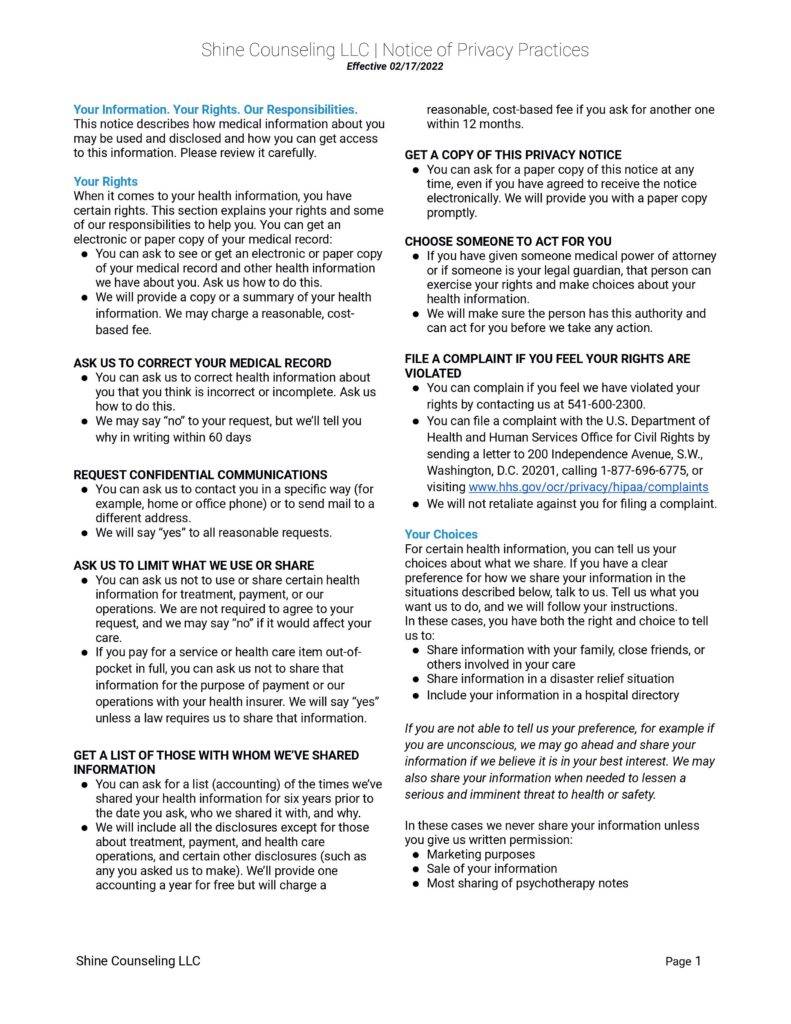Individual Counseling or Therapy
Individual Counseling and Therapy
Home - Therapy and Counseling Services - Individual Therapy and Counseling
Everything about Individual Counseling
It is not an exaggeration to say that everyone goes through obstacles in their lifetime. Sometimes these challenges are easy enough for us to face by ourselves, and other times they can feel like too much weight on our shoulders. That’s where therapy can come in to help! Without further ado, let’s take a look at what we’re going to learn about today.

Table of Contents
What is Individual Counseling?
Individual Therapy, also known as psychotherapy, counseling, or talk therapy, is a one-on-one session between individuals and their therapists. Unlike in group, family, or couples therapy, no one else will be in the room but a therapist and their client. This allows for a sense of security that many clients look for: knowing that their therapist will not judge them. In these sessions, a client can request help for stressful life events such as getting laid off of a job, losing a loved one, difficulties with a boss or co-worker, and more. The therapist and client work together to set up goals and treatment plans for them to work on. This evidence-based type of therapy has proven to help some clients with their struggles.
How did Individual Counseling begin?
Individual Therapy can be credited originally to the Ancient Greecian idea of caring for the soul. Later, a well-known man from Austria expanded this idea into the type of psychology we know today! Many people have heard of Sigmund Freud but don’t know that he founded “Psychoanalysis.” This is one of the most popular kinds of Individual Therapy. Freud focused on the idea of bringing the subconscious, a part of our mind we are not fully aware of, to our attention. This is one of the reasons a therapist works to bring new habits and strategies to their client’s attention: they may not have thought of them before. They hope that this will lead to that classic “ah-ha” moment many people wish to experience. Many others, such as Carl Jung (who had many ideas on what makes up people’s personalities), have also paved the way towards our understanding of Individual Therapy!


Who may find Individual Counseling helpful, and what can it do?
Because Individual Therapy is so diverse, it can cover many of the different obstacles that someone may be experiencing. A few of which include: Stress, Anxiety, Depression, Addiction, weight gain or loss, the loss of a loved one, and even more. It is also important to remember that this kind of therapy can even help people who aren’t experiencing these problems, especially when paired with Positive Psychology. Anyone who wants to get to know themselves better, wants help, or even a sense of self-improvement could be an excellent fit for Individual Therapy! Individual Therapy focuses on letting the client decide what they want to discuss and work on, and their therapist will be by their side every step of the way.
Individual Therapy and the internet
Online therapy has been growing in popularity lately, and it certainly has a place in Individual Therapy as well! Online treatment is excellent for people who have a busy schedule or anything that may restrict them from making it into a traditional therapist’s office. Like with DBT, online therapy can also act as a hotline for those who may need it. It’s clear that online Individual Therapy has its benefits, but what about traditional in-person therapy? Well, a connection with one’s therapist is absolutely essential. This allows a client to build a trusting, open relationship with the professional who is helping them. Sometimes in an online setting, a client can miss out on the solidarity of a therapist’s office. That being said, all this can be combated by encouraging the client to attend their sessions without distractions. This way, they can still feel the sense of privacy they need to succeed!
Edify Therapy and Individual Therapy
Our group of trained therapists is ready to help anyone interested in Individual Therapy. At Edify Therapy, we are sure to practice Positive Psychology and the idea that everyone’s lives have the potential to be improved with some hard work and commitment. If you have any questions or would like to begin your mental health journey with us by your side, please feel free to contact us.
In depth explanation of how Individual Therapy works!
Individual Therapy is a broad term, meaning that this type of therapy can apply to many we have already learned about. Positive Psychology, EMDR, CBT, IFS, and more can all be provided through Individual Therapy. So, how do these sessions work in general? Let’s take a closer look.
1. Battling stereotypes
When a person first hears the word “therapy,” they may jump to an image of someone laying down and talking about their dreams. Although this Freudian tactic is sometimes used, it isn’t necessarily an accurate idea of what therapy sessions look like. The therapist and client will often discuss things together instead of a therapist just nodding their head. A therapist will usually assign homework and teach valuable skills for their client to use outside of their session. Depending on the kind of therapy and the client, each session will be unique.
2. The first session
During the first session of therapy, clients may feel nervous or even excited. These are perfectly normal feelings and often come up before meeting with your therapist. The therapist can sometimes talk less during the first session to let the client steer them in their chosen direction. This will help the pair identify things to work on and explore in the future. It is important that the client feels comfortable with their therapist to open up to the best of their ability. Sometimes this takes a few tries, but once someone finds a therapist they like, the pair can start taking steps towards helping the client’s journey to further happiness.
3 Tactics and homework
During sessions, it is common for a therapist to assign their clients homework or teach them strategies to help them along the way. So, what do each of these mean? Firstly, homework is anything that the therapist asks their client to do outside of their office. In Individual Therapy (especially in CBT), this can often mean keeping a journal, drawing their mood, or even recording the thoughts that they would like to work on. This helps hold the client accountable for focusing on improvement and gives the therapist a better idea of how well the treatment is working. Secondly, there are strategies. More specifically in DBT where clients sometimes feel fragile, it is essential to learn specific calming techniques for when they need them. For example, someone undergoing an anxiety attack may learn to check in with their five senses or practice slow, controlled breathing to calm their feelings.
Summing it up
Individual Therapy is a reliable, evidence-based practice that can assist anyone looking for help or guidance. As a one-on-one practice, this form of treatment is one of the most common approaches to therapy. A client and therapist work together to dive into a client’s issues, concerns, or goals with the hopes of strengthening their mental health. People can go to Individual Therapy for various reasons and can leave feeling more confident in themselves and in their future.

Evidence Based Practice Research Resources
Frequently Asked Questions
There is no such thing as no communication. For instance, even when we’re silent, we’re communicating something. Perhaps we are not in the mood for a talk that speaks for itself, doesn’t it? On the other hand, when we are in an exploratory mood, we ask questions. As a result, our intellectual capacity increases.
Have questions? We’re here to answer them! Let’s take a look at some of the most common ones concerning Individual Therapy.

The first thing you can do is contact a therapist about your issues, concerns, or goals to see if they are right for you. Once you find a therapist you feel comfortable with and trust, you can work to improve your mental health with professional help by your side!
No! Although Individual Therapy may sometimes involve a couch and a chair, it's not all the Freudian style that first comes to mind. In fact, many of those past ideas have proven to have their issues after extensive research and testing. Psychology is constantly updating with new tactics and treatment methods to provide you with the best care possible.
Great question! It may be helpful to refer to a therapist or a client about their own first-session experiences so you know what to expect. Many first sessions involve the therapist stepping back and allowing the client to take the session in whatever direction they feel comfortable with. The hope is to identify things to work on that the pair can later discuss in further detail.
Home - Therapy and Counseling Services - Individual Therapy and Counseling

